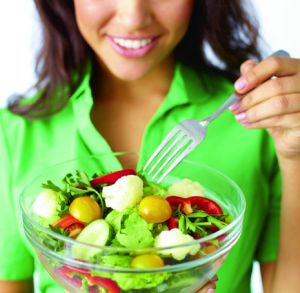
Red Rock Noodle Bar
Phil Colburn, managing director at Queensland based Red Rock Noodle Bar says customers today are definitely concerned with nutritional value.
“The consumer demand is going from strength to strength. The education level has improved. Customers used to ask us questions, now when we speak to them they have a lot more understanding about the issues,” he says.
For this Asian inspired franchise chain, signing on footballer Corey Parker has been a big part of highlighting healthier living choices. Parker has a social media contract that focuses on him blending the brand and healthy eating in to his lifestyle.
“It’s the first time we’ve had an ambassador. He’s well known up here, he puts in the extra hours before and after training,” says Colburn.
Corey’s Favourites is a new promotion that started early this year, showcasing on the menu the dishes he uses and eats regularly. A promotion in March and April picks up on the taste for satay – with Corey Parker’s dish included.
When it comes to the noodles, Red Rock will continue to add more flavours, but finds customers like the traditional dishes, with teriyaki and satay becoming stronger on the menu. Serving up salads for summer and soup for winter seems a sensible approach adopted by the business.
There’s a new lunch time focus too and a fresh model for the predominantly dinner-based business, with new outlets to set up in service centres and food courts to target the high volume lunch trade.
“People are changing. We’re very strong in dinner in strip malls, about 75 percent, but we’re not in the middle of malls in city centres. We’re working with centres like Centro,” explains Colburn. “Expansion has been pretty good over the last two years, we’ve done double digits.”
The business development remains focused on Queensland for the next 12 months, areas such as the south east of the state, Gold Coast and Toowoomba. It’s Parker’s home territory, and makes greatest use of him as a brand ambassador.
Existing customers have proved fertile ground for growing the business through upselling, particularly through online and Facebook ordering. Colburn reports customers have increased the value of their order by up to 30 percent. “We’re getting more sides and extras, people are not feeling pressured, they are more relaxed and can take their time [online]. Customers are grabbing larger box sizes.”
And an affiliation with Ben & Jerry’s is also paying off with every third order including an ice cream treat, even in the lower demographic regions.
Go Sushi and Wasabi Warriors
Kate McMahon, responsible for marketing at Pacific Retail, an umbrella group that includes Go Sushi and Wasabi Warriors, agrees that the healthy lunch market in particular is growing. “People are really caring and we’re talking about healthy eating.”
The Go Sushi business is catering for nutritionally aware consumers with low fat and gluten free options, and all the meals are freshly made in store. Sibling brand Wasabi Warriors has an organic food profile.
Customers are quite consistent with their menu choices, particularly Go Sushi customers, says McMahon. Nevertheless, refreshing the menu is important, as is serving up innovation. “We update our menu yearly. We’ve introduced a lunch pack and are trying to invent options.” For instance, two summer packs have been launched, one salmon (with omega 3 the nutritional pull), and a power protein pack.
The lunch packs allow for upselling, a major focus for the franchises, and one way that is being achieved is by adding a drink to a lunch pack for thirsty diners.
Go Sushi had a huge growth plan for 2012, says McMahon, with more than 14 stores opened. Another 20 will be unveiled in 2013 across both brands, though Wasabi Warriors’ CBD focus proves a challenge when it comes to finding sites.
The right location is essential for the success of a franchise, says McMahon.
- Coming up in part two: Le Wrap, Healthy Habits, SumoSalad

